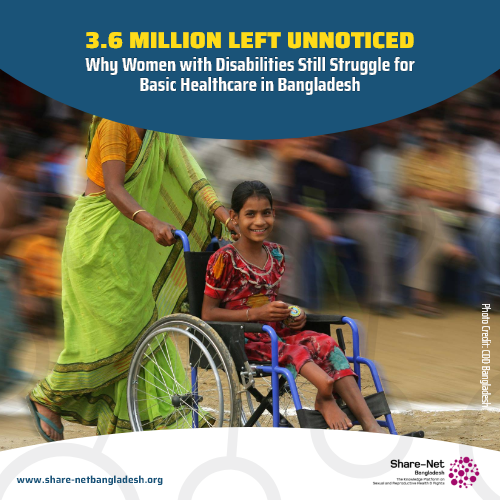3.6 Million Left Behind: Why Women with Disabilities Still Struggle for Basic Healthcare in Bangladesh
In a country striving to make healthcare inclusive and accessible for all, women with disabilities in Bangladesh continue to face some of the steepest barriers — from hospitals without ramps to the lack of sign language interpreters and discriminatory systems that deny them basic maternal entitlements.
Take Sanjida Akter, a 33-year-old wheelchair user from Dhaka. Despite being educated and employed at an NGO, she dreads visiting hospitals. “It would be a miracle if I ever received treatment without hassle,” she told The Business Standard. She waits in long queues, can’t reach help desks due to her height, and struggles to navigate buildings without ramps or visual signage.
According to the Bangladesh Bureau of Statistics (BBS), there are over 3.6 million people with disabilities in the country — more than 1.4 million of them are women. Yet the 2021 National Survey on Persons with Disabilities shows that only 26.7% of people with disabilities access public healthcare, compared to 22.8% of the general population. This already low number reflects even poorer access when disaggregated by gender, geography, or type of disability.
For women and girls, especially in rural areas, the situation is worse. Shahriar Salim, whose 14-year-old daughter Jannat has both physical and neurological disabilities, says she’s been on the same prescription for four years. “We don’t have pediatric neurologists in Jessore. Without Dhaka, there’s no option,” he said.
The challenges are layered — infrastructure, attitudes, and policy gaps all come into play. Visually impaired patients like Ujjala Bonik report that even private hospitals fail to accommodate them. “Most staff don’t know that persons with disabilities are supposed to be given priority,” she said.
Dr Halida Hanum, a women’s health expert and member of the Women’s Reform Commission, emphasizes how these barriers multiply for women:
“Women with disabilities face a unique set of challenges — from social stigma and lack of accessible information to discriminatory practices in healthcare. SRHR services, including antenatal care and menstrual hygiene, remain largely out of reach.”
The disability allowance provided by the government is often the only form of state support, but it’s not enough. Worse still, pregnant women with disabilities are denied maternal allowance on the grounds that they already receive disability benefits. Dr Hanum calls this “systemic discrimination,” noting that the cost of disability cannot substitute the cost of pregnancy and maternal care.
Government officials claim improvements are underway. Ramps are being added in hospitals, and some beds are reserved for disabled patients. But these promises fall short in practice, especially outside urban centers.
As Bangladesh continues to strengthen its SRHR commitments and pursue the Sustainable Development Goals, experts say disability inclusion must move from policy to practice — ensuring that no woman, regardless of her ability, is left behind in accessing the health and rights she deserves.
Source: TBS News

